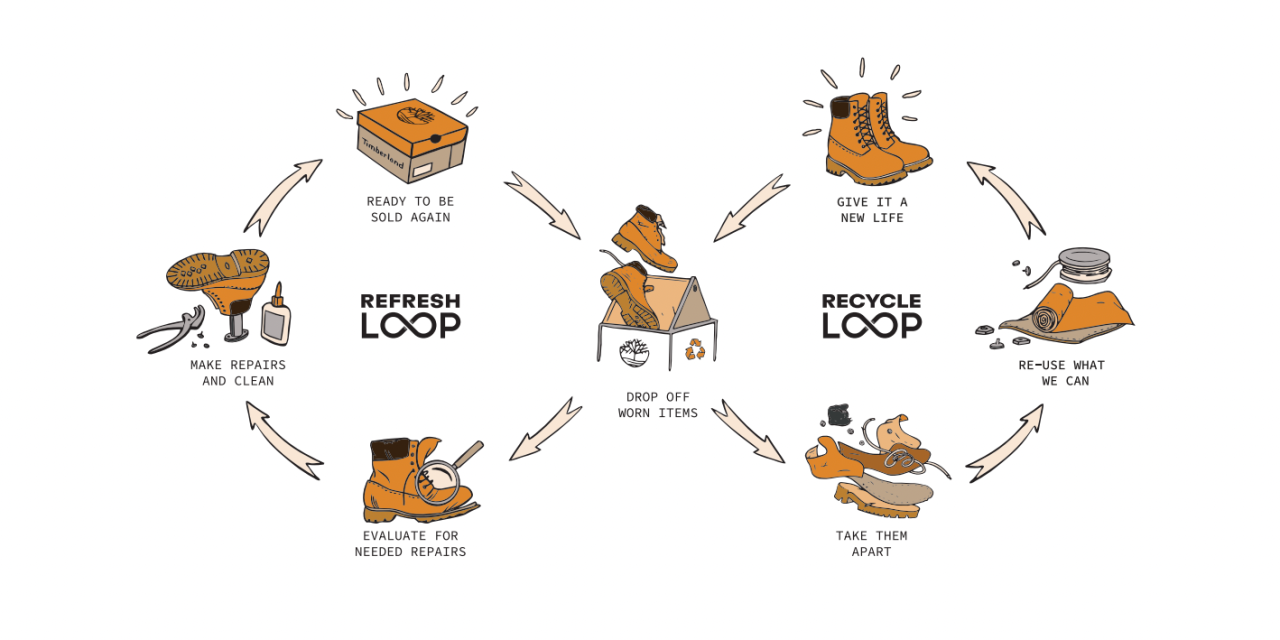Timberland launches recycling program for footwear and apparel

Today, Timberland is launching Timberloop, a circular sustainability program in which customers can donate old items to be fixed and resold or recycled for 10% off their next purchase.
Timberland was founded in 1952 in Boston and sells a variety of outdoor footwear and apparel, all of which will be accepted under the new Timberloop program. In the spring — following a few months of donations — the brand will release a new resale-specific site to allow consumers to buy secondhand products at a discount. Atlanta Mcllwraith, Timberland’s director of global community engagement and activation, said the program will help the brand reach its goal of full product circularity by 2030 and appeal to outdoor enthusiasts who are increasingly sustainability-minded.
U.S. Timberland consumers can now drop off old products both in-store and online. Products with less wear and tear will later be resold, while more used styles will be recycled for parts like zippers or grommets, explained Mcllwraith. In turn, those who donate will receive 10% off on their next in-store or online purchase. The program will be in partnership with Recircled.
“The Timberloop program is really a critical milestone for us in achieving our 2030 goal to create net positive product,” said Mcllwraith.
To achieve its goal of carbon-positive products, the brand is pushing towards a circular or closed-loop model where all products are either resold or recycled for a second or third lifecycle. In addition, Timberland plans to make products out of 100% natural materials collected via “regenerative agriculture.” Regenerative agriculture aims to make farming carbon neutral or even net-positive through techniques like cover crops or reduced tillage.
Mcllwraith said it’s too soon to say what the brand’s spring resale site launch might look like. However, Timberland is encouraged by the larger trend of consignment shopping and believes its outdoor-focused consumer will buy into the model.
“Many of our consumers share our passion for the outdoors and want to protect it as much as we do,” said Mcllwraith.
Ad position: web_incontent_pos1
Interest in sustainable practices — or at the very least sustainable marketing — was on the rise in 2021. From November 2018 to November 2021, indexed Google searches for the term “sustainable products,” for example, rose 185%, according to GoogleTrends.
But in many ways, Timberland is late to the resale game compared to heritage outdoor brands like Patagonia, LL Bean or North Face. Patagonia launched its free repair program in 2017, NorthFace launched its recycling program in 2017 and LL Bean has been repairing products like its waterproof Bean Boots since the ’80s.
Timberland doesn’t yet offer a repair-to-return service for its customers. However, Mcllwraith said that developing that model is “definitely an aspiration for us.”
Jenny Gyllander, founder of Thingtesting, a site that reviews new consumer products said circular models are “positive first steps” to actually becoming a sustainable brand, versus just engaging in green-washed marketing.
“[Brands] should be responsible for the products that they put out into the world and think about the full life cycles of where they end up,” said Gyllander.
Ad position: web_incontent_pos2
Beth Goldstein, a fashion footwear and accessories analyst at NPD group said that while “it may be hard to quantify the return-on-investment immediately” for circular programs, that ultimately “the risk of not moving in this direction is too great.”
On top of allowing brands to meet sustainability goals, the strategy also takes advantage of the apparel resale boom, said Gyllander. The apparel and accessories resale market is expected to grow 15% to 20% each year for the next five years, according to the Boston Consulting Group.
“The alternative is that [brands’] goods and products are then sold on other secondhand platforms,” said Gyllander. With their own resale programs, added Gyllander, brands can create a consistent experience across new and used goods and keep consumers in-house throughout a product’s lifecycle.
In addition to the new Timberloop program, Timberland will also release its new “Timberloop Trekker” hiking boot on Earth Day, that’s designed with circularity in mind. For example, the soles will be easier to remove compared to other Timberland boots, to make it easier to recycle. In the future, more and more of Timberland’s styles will be designed with disassembly in mind, said Mcllwraith.
Going forward, Timberland also plans to invest in marketing specifically highlighting these new sustainability efforts. The brand plans to promote Timberloop on social media and through email marketing, particularly during sustainability-focused events like Earth Day or during spring cleaning. In-store, associates will wear buttons and t-shirts promoting Timberloop, and floor space will be dedicated specifically for drop off.
“We just wanted to make sure that we have an easy engagement point for all consumers,” Mcllwraith said.

